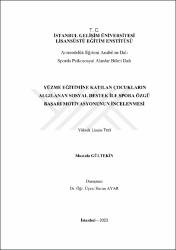Yüzme eğitimine katılan çocukların algılanan sosyal destek ile spora özgü başarı motivasyonunun incelenmesi
Özet
Bu çalışmanın amacı kız ve erkek yüzme sporu yapan çocukların algılanan sosyal destek ile başarı motivasyonu düzeylerinin incelenmesi ve elde edilen verilerin literatürdeki diğer çalışmalar ile kıyaslanması amaçlanmıştır. Araştırmanın örneklemini 137 kız ve 123 erkek sporcu toplamda 260 gönüllü katılımcı oluşturmuştur. Katılımcılara çalışma hakkında bilgi verildikten sonra çalışmaya katılım gönüllülük esasına dayalı olarak yürütülmüştür. Bu araştırmanın amacı doğrultusunda, iki veya daha fazla sayıdaki değişkenler arasında birlikte değişim varlığını ve/veya derecesini belirlemeyi amaçlayan araştırma modeli olan ilişkisel tarama yöntemi ve var olan/doğal olarak ortaya çıkmış bir durum ya da olayın nedenlerini ve bu nedenlere etki eden değişkenleri ya da bir etkinin sonuçlarını belirlemeyi amaçlayan tarama modeli nedensel karşılaştırma yönteminden yararlanılmıştır. Veri toplama yöntemi olarak anket (survey) tekniği uygulanarak gönüllülük esasına dayalı çevrimiçi veri toplanmıştır. Toplanan verilerin çözümlenmesinde SPSS 25.0 paket programından faydalanılmıştır. Sonuç olarak cinsiyet değişkenlerine göre incelendiğinde, Algılanan Sosyal Destek ölçeği, aile, arkadaş, özel insan alt boyutlarında istatistiksel açıdan anlamlı bir farklılığın olduğu tespit edilmiştir. Yaş değişkenlerine göre algılanan sosyal destek ve alt boyutlarının düzeyleri incelendiğinde, Aile Alt boyutu istatistiksel açıdan anlamlı bir farklılığın olduğu saptanmıştır. Eğitim durumu değişkenlerine göre Algılanan Sosyal Destek ve alt boyutlarının düzeyleri incelendiğinde, Aile Alt boyutu istatistiksel açıdan anlamlı bir farklılığın olduğu saptanmıştır. Yüzme özgeçmişi değişkenlerine göre incelendiğinde, güç gösterme güdüsü alt boyut istatistiksel açıdan anlamlı bir farklılığın olduğu saptanmıştır. Spor yapma sıklığı değişkenlerine göre, algılanan sosyal destek ve alt boyutlarının düzeylerini değerlendirmek için incelendiğinde, aile alt boyutu istatistiksel açıdan anlamlı bir farklılığın olduğu saptanmıştır. Algılanan sosyal destek ile spora özgü başarı motivasyonu arasında istatistiksel olarak anlamlı bir sonuç bulunamamıştır. The The aim of this study was to examine the levels of perceived social support and achievement motivation among boys and girls engage in swimming, and to compare the obtained data with other studies in the literature. The sample of the study consisted of 260 voluntary participants, including 137 girls and 123 boys who are swimmers. After providing information about the study, participation was conducted on a voluntary basis. In line with the aim of this research, the relational scanning method, which aims to determine the presence and/or degree of co-variation between two or more variables, and the causal comparative scanning method, which aims to determine the reasons for a naturally occurring situation or event and the variables that affect these reasons or the outcomes of an effect, were utilized. The data were collected through the survey technique, and online data collection was carried out based on voluntary participation. The collected data were analyzed using the SPSS 25.0 software package. As a result, when examined according to gender variables, statistically significant differences were found in the perceived social support scale in the dimensions of family, friends, and significant others. When the levels of perceived social support and its sub-dimensions were examined according to age variables, a statistically significant difference was found in the family sub-dimension. Similarly, when examined according to educational status variables, a statistically significant difference was found in the family sub-dimension of perceived social support and its sub-dimensions. In terms of swimming background variables, a statistically significant difference was found in the sub-dimension of assertiveness motivation. When the levels of perceived social support and its sub-dimensions were evaluated according to the variable of frequency of engaging in sports, a statistically significant difference was found in the family sub-dimension. However, no statistically significant relationship was found between perceived social support and sport-specific achievement motivation.
Bağlantı
https://hdl.handle.net/11363/7083Koleksiyonlar
- Yüksek Lisans Tezleri [1219]

















